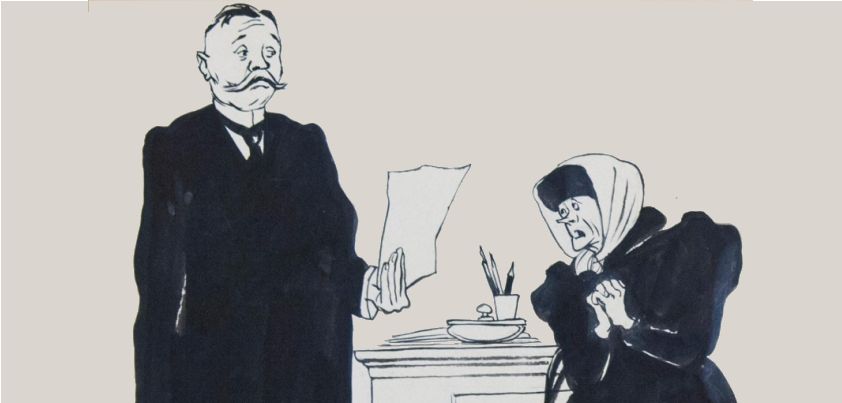 Seen as an allegory of aspects of Soviet life (censorship and fear of malevolent authority), this story by Vasily Aksyonov contrasts the stressful life of a father with the blissful world of his three-year-old son. Returning home after a difficult day, the weak-willed man would rather spend time in the fantasy world of the boy, whose imagination makes everything right, than make an important phone call. He dreads the outcome of the call, which appears critical to his family and friends, and keeps putting it off. Themes include childhood innocence vs. adulthood, father-son relationships, fantasy, manipulation of reality, fear, procrastination. More…
Seen as an allegory of aspects of Soviet life (censorship and fear of malevolent authority), this story by Vasily Aksyonov contrasts the stressful life of a father with the blissful world of his three-year-old son. Returning home after a difficult day, the weak-willed man would rather spend time in the fantasy world of the boy, whose imagination makes everything right, than make an important phone call. He dreads the outcome of the call, which appears critical to his family and friends, and keeps putting it off. Themes include childhood innocence vs. adulthood, father-son relationships, fantasy, manipulation of reality, fear, procrastination. More…
Interpreter of Maladies
 Interpreter of Maladies is the titular tale in Jhumpa Lahiri’s award-winning debut short story collection. The stories deal with different aspects of the cultural and relationship issues facing people of Indian heritage in the modern world. This story contrasts two empty marriages. The Indian protagonist (a doctor’s translator who moonlights as a tour guide) fantasizes that the wife in an Indian-American family he takes sightseeing has a romantic interest in him. Rather than love, she wants his help to find a “cure” for a foolish mistake she once made. Themes include marriage, communication, poor parenting, loss, guilt, loneliness, self-esteem. More…
Interpreter of Maladies is the titular tale in Jhumpa Lahiri’s award-winning debut short story collection. The stories deal with different aspects of the cultural and relationship issues facing people of Indian heritage in the modern world. This story contrasts two empty marriages. The Indian protagonist (a doctor’s translator who moonlights as a tour guide) fantasizes that the wife in an Indian-American family he takes sightseeing has a romantic interest in him. Rather than love, she wants his help to find a “cure” for a foolish mistake she once made. Themes include marriage, communication, poor parenting, loss, guilt, loneliness, self-esteem. More…
The Fisherman and His Wife
 It’s time for another folktale. This one is about dissatisfaction and greed. A poor fisherman catches an enchanted fish and sets it free. When he tells his wife, she is angry that he did not demand a wish in return. She sends him to ask the fish for a nicer house. When the fish grants this, the wife becomes greedy. She sends her husband back several times to ask for bigger and bigger things. Her final wish is so outrageous that the fish either will not or cannot grant it. The fisherman is no doubt happy with what happens next. More…
It’s time for another folktale. This one is about dissatisfaction and greed. A poor fisherman catches an enchanted fish and sets it free. When he tells his wife, she is angry that he did not demand a wish in return. She sends him to ask the fish for a nicer house. When the fish grants this, the wife becomes greedy. She sends her husband back several times to ask for bigger and bigger things. Her final wish is so outrageous that the fish either will not or cannot grant it. The fisherman is no doubt happy with what happens next. More…
The Call of the Wild
 Set during the 1890s Klondike Gold Rush, this story by Jack London chronicles the devolution of a domesticated dog into the leader of a pack of wild wolves. A huge St. Bernard-Scotch Shepherd cross, is dog-napped to meet the demand for sled-dogs. Transported to the Yukon, he soon learns the law of club and fang and the meaning of the maxim survival of the fittest. The story is not for the faint-hearted. True to the times, it includes many examples of human and animal brutality, suffering, folly and death. Themes include greed, survival, violence, mastery, instinct, regression, community, pride, loyalty. More…
Set during the 1890s Klondike Gold Rush, this story by Jack London chronicles the devolution of a domesticated dog into the leader of a pack of wild wolves. A huge St. Bernard-Scotch Shepherd cross, is dog-napped to meet the demand for sled-dogs. Transported to the Yukon, he soon learns the law of club and fang and the meaning of the maxim survival of the fittest. The story is not for the faint-hearted. True to the times, it includes many examples of human and animal brutality, suffering, folly and death. Themes include greed, survival, violence, mastery, instinct, regression, community, pride, loyalty. More…
A Defenseless Creature
 In addition to his tales highlighting serious issues such as poverty, class, death and unfulfilled expectations, Anton Chekhov wrote dozens of comic short stories to support himself through medical school. In this story, a persistent, shrew-like woman wears down a sickly banker. The exasperated man finally pays money the woman claims is owing to her husband out of his own pocket, even though the alleged debt has nothing to do with his bank. Despite the woman repeatedly describing herself as such, readers are left wondering if the harried banker is the titular “defenseless creature”. Themes: bureaucracy, communication, desperation, persistence. More…
In addition to his tales highlighting serious issues such as poverty, class, death and unfulfilled expectations, Anton Chekhov wrote dozens of comic short stories to support himself through medical school. In this story, a persistent, shrew-like woman wears down a sickly banker. The exasperated man finally pays money the woman claims is owing to her husband out of his own pocket, even though the alleged debt has nothing to do with his bank. Despite the woman repeatedly describing herself as such, readers are left wondering if the harried banker is the titular “defenseless creature”. Themes: bureaucracy, communication, desperation, persistence. More…